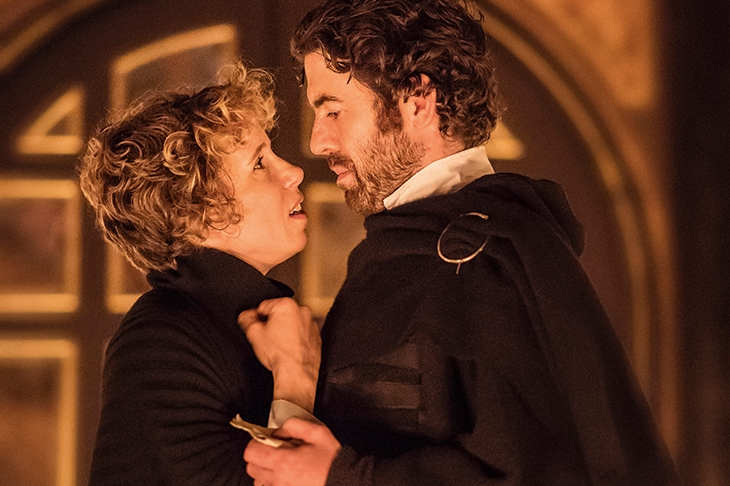Michelle Terry, chatelaine of the Globe, wants to put an end to penis-led Shakespeare by casting women in roles intended for men. To showcase her war on male cronyism she presents a version of Macbeth starring Paul Ready as the king. She plays the queen. In real life the two are married. This must be rather galling for the actresses who auditioned for the lead role only to find that Ms Terry’s pro-woman policy had collapsed before the demands of her lord and master. But their on-stage partnership is astonishingly powerful.
Set in the Sam Wanamaker theatre, a gilded little playhouse with uncomfortably cramped seats, this candlelit Gothic thriller has a palpable sense of horror and menace. Behind every flickering shadow lurks a traitor with a dripping knife. Ready, a superb Macbeth, has a handsome, kindly face that suggests a pliable nature easily dominated by his psychotic spouse. Hissing, plotting and brooding, Ms Terry’s Lady Macbeth has let her ambition and hypocrisy curdle into a full-blown personality disorder. Their feuds and rows have an obvious simplicity and truth. When Macbeth’s temper boils over, he manhandles the queen with a brutal roughness and yet their bodies appear to melt into one another in an embrace that looks both violent and loving. Only real partners could suggest such intimacy. This is one of the finest productions I’ve ever seen at the Globe. Ms Terry will now face calls to explore more of Shakespeare’s warring lovers with her husband by her side. A triumph for crony casting.
Human beings are programmed to repeat actions that reward them — playwrights included. Harold Pinter established himself as Britain’s foremost dramatist by placing inscrutable characters in cryptic situations and he was bound to keep the production line in motion, knowing that his oblique scripts would be greeted by genuflecting reviewers, ecstatic professors of literature and shrewd thesps ululating with approval at every rehearsal. Had he been respected but not worshipped, Pinter would have left a stronger canon. The classic that we sorely miss from him is the rip-roaring family comedy.
Instead we have plays like Moonlight, from 1993, an indecipherable mystery featuring a civil servant (Robert Glenister) who claims to be on his deathbed even though he looks in fine fettle. He barks out his lines like a duke summoning a ghillie across the grouse moor. Mystifying characters attend his sick bay. Two young men, who may or may not be his sons, exchange long screeds of inane chatter. A smiling twerp surges into the room and makes declarations about his friendship with the expiring bureaucrat. Janie Dee, wasted in a minor role, sprawls sexily across the mattress hinting at infidelities, while Brid Brennan plays the patient’s wittering wife who now acts as his faithful carer. But why does she care for him? And is she the mother of the two young men whose tedious jabber takes up so much stage time? The script is an algebra problem without a solution. The over-rich decor is oppressive, and the lighting seems to have been botched, with distracting shadows falling amateurishly across the walls. This production may accidentally drive the script into permanent disuse. No bad thing.
Pinter was often criticised for creating generic female characters who were either dinner ladies or prostitutes, the suppliers of cake or sex. Both these archetypes are on display in Night School, an intriguing and patchily successful play from Pinter’s early period. Walter is a wannabe gangster released from prison who finds that his aunt has rented out his bedroom to a mysterious beauty, Sally, who claims to be a teacher but works as a call girl. Dim-witted Walter likes to pretend that spells in prison are monastic sabbaticals giving him help on his journey towards self-improvement. Terrified and excited by Sally’s sexuality, he chats her up by citing his profession as ‘gunman’. She’s a northerner and therefore an exotic rarity in London in the 1960s. ‘They’re northern eyes,’ he says, gazing into her peepers while fumbling for an appropriate gallantry. ‘They’re full of soot.’
The aunt and her sister eavesdrop on the lovebirds’ hilarious dialogue and provide a commentary as their romance develops. Janie Dee, playing the aunt, barrels around like an Abrams tank, her svelte shape amplified by a rack of synthetic bazoomers. It’s not much of a role — Babs Windsor meets Martine McCutcheon — but it’s better than sitting in the dressing-room. Pinter fails to capitalise on his best asset, the mismatched lovers, and sends his script up a blind alley by exploring the life of a shifty businessman (Robert Glenister) who makes opaque speeches about tax evasion. To succeed, the play needs a strong narrative ending but that was an art Pinter never mastered. His genius, if that’s the word for him, lay in his ability to turn his main professional failing into an asset.







Comments